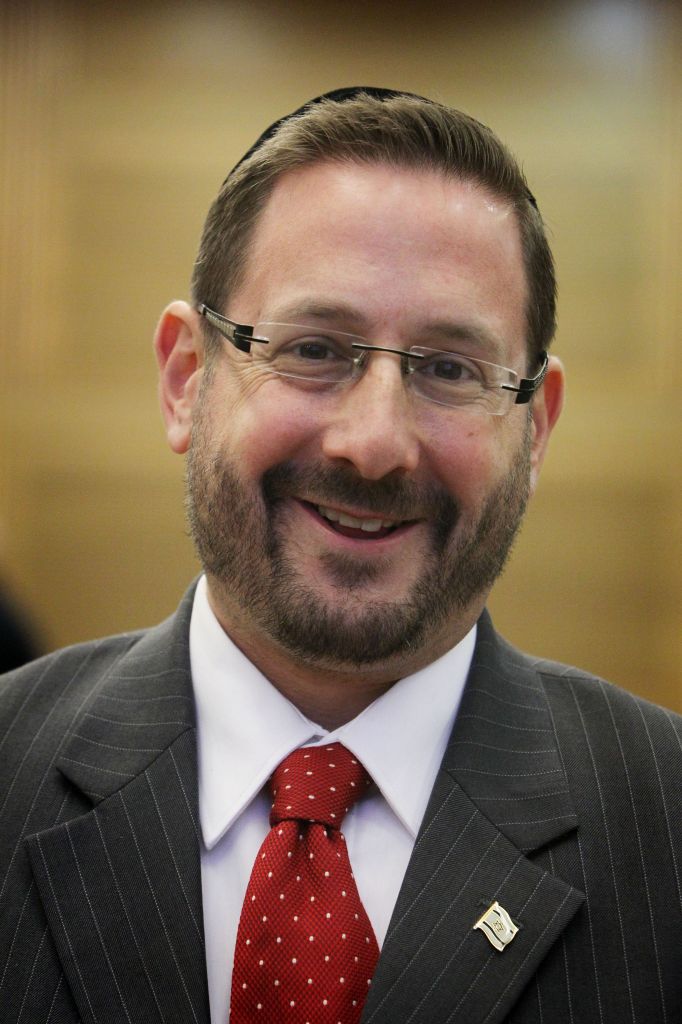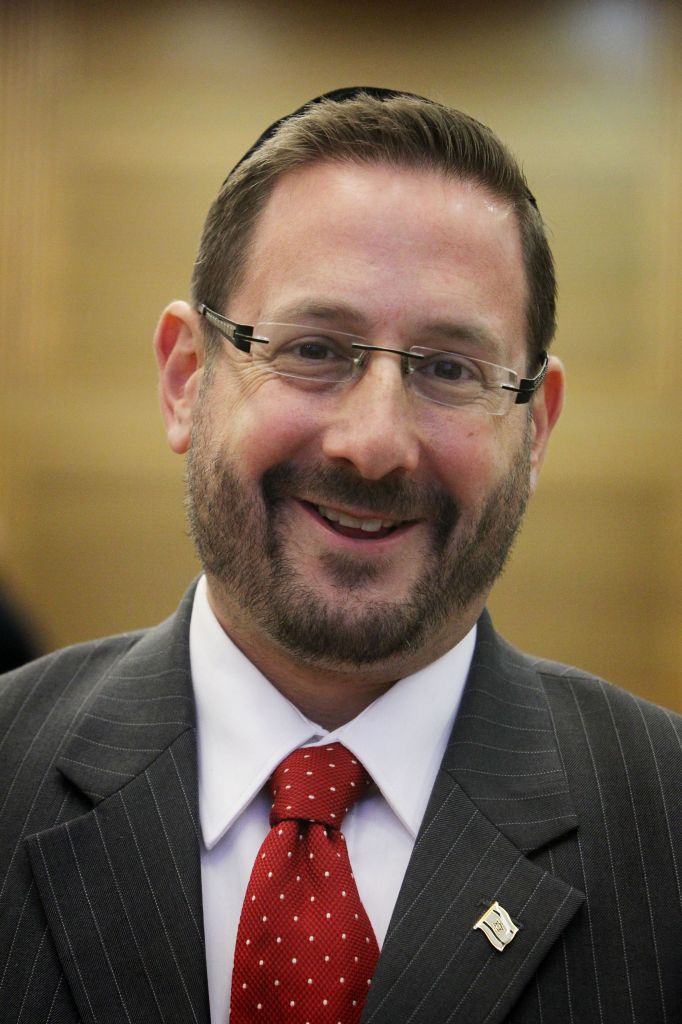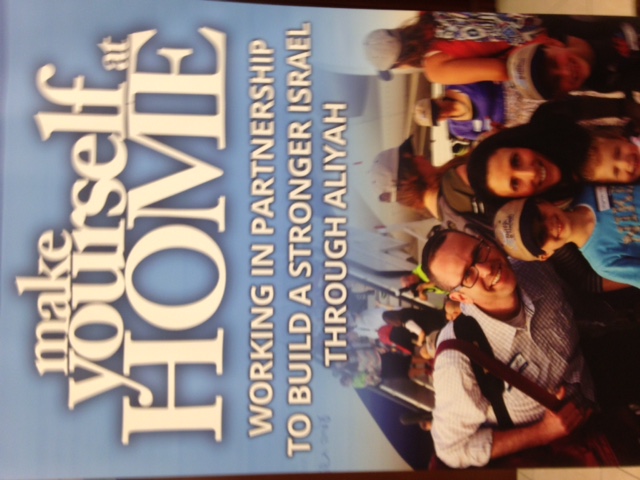
Early into his address “Behind the Scenes in the Knesset: My Life in Israel,” it became apparent that those who came to hear Rabbi Dov Lipman speak would be in for a treat.
Rabbi Lipman, in an event at Teaneck’s Congregation Beth Aaron, sponsored by Nefesh B’Nefesh, certainly was an inspiration for those considering aliyah, and a wealth of knowledge about Israel’s political system even for those who weren’t. He noted that over the years so many people resettling in Israel have done so because they were running away from something. North American Jews, however, were part of a new breed running towards something.
In an earlier phone interview, Rabbi Lipman related that for him aliyah was a “soul-based” decision. His wife and he had been chaperones on a trip that explored Israel from top to bottom. As they approached the Judean Hills, those on the bus broke into a spontaneous rendition of Jerusalem of Gold. It was a powerful moment. Tears streamed down the faces of both his wife and him and they knew then they would be making the life-changing move. Not long after, they reached out to Nefesh B’Nefesh. On his aliyah flight, he related the El Al pilot’s announcement to the planeload of new olim as they embarked on their journey. “Everyone relax—I’m here to take you home.”
Rabbi Lipman was armed with entertaining and informative stories of his life in Israel in general, and as a member of the Knesset in particular. He had chosen to settle in Beit Shemesh because of its diversity, and looked forward to a special sense of unity among his fellow Jews. But he was in for a rude awakening. In a clash that received worldwide attention, extremists (he refused to consider them Charedim), repeatedly hurled insults at girls attending a Modern Orthodox school. Additionally, they put up a yellow sign that read “It is forbidden for women to walk on these streets dressed in immodest clothing.” The sign irked Rabbi Lipman, so he bought spray paint, went out at 2:00 a.m., and painted it over. New signs appeared days later and again he painted over them. This went on until Rabbi Lipman decided to preserve his spray cans and no longer paint over every word. The altered sign read “It is forbidden for women to walk on these streets dressed in clothing.” He said that shortly after the signs disappeared.
Rabbi Lipman showed himself to be an activist who could get things done. It caught the eye of Yair Lapid, leader of the Yesh Atid party. The two sat down, and although Rabbi Lipman was a religious Jew from America while Lapid was secular from a European background, Rabbi Lipman realized that they agreed on 80 percent of the issues. As Lapid put it “On the 80 percent we can move forward, and on the other 20 percent we’ll work together.”
He offered Rabbi Lipman the #17 seat of the party in the upcoming elections. Since they only held 5–6 seats at the time, Rabbi Lipman didn’t expect anything to come of it, but was flattered nonetheless. Lapid felt otherwise about the chances, and when elections were held three months later, was proven to be right. Rabbi Lipman felt a heavy burden the morning after, realizing that 500,000 people had just voted them in and expected representation of their views. The first order of business, however, was Rabbi Lipman’s American citizenship. Since a member of the Knesset was forbidden to hold citizenship from another country, he had to renounce it, which didn’t come lightly.
Rabbi Lipman spoke of the language and cultural challenges that came with serving in the Knesset. He struggled mightily to become fluent in Hebrew, and learned to yell when he needed to get his point across, even though it was against his nature. On a more strategic note, it didn’t take long for him to realize that accomplishing most of the items on his wish list was a pipe dream. He readjusted his focus with the goal of addressing 20 percent of his agenda, hoping to make an impact.
Among Rabbi Lipman’s most memorable moments while serving was when a Knesset delegation was sent to visit Auschwitz and he found himself standing on the same grounds as his grandmother had 70 years earlier. Both of them had been surrounded by soldiers, only in his case they were proud Israelis.
He spoke of the camaraderie of the Knesset members. They could scream at each other in the main chamber but retire to a room just behind it moments later where beverages and snacks were served, and talk as friends, regardless of party affiliation. There was an absolute ability to draw the line between political and personal.
When he got involved in public diplomacy, Rabbi Lipman learned how alone the State of Israel really is. “What you see in front of the camera is nothing compared to what happens behind closed doors.” He spoke of a French Minister angrily accusing Israel of being the cause of radical Islam, and of a South African Parliamentarian asking him if his son will be serving in the army. When he proudly said yes, he was asked “How does it feel to have a son who is a baby killer?”
Despite all this, Rabbi Lipman said there is no reason to be filled with anything but optimism regarding Israel’s future. As a member of the Knesset, sure there was a lot of raucous disagreement, but “It’s our parliament arguing about (what’s best for) our people, which is an incredible blessing.” That, along with being able to witness the ingathering of the exiles firsthand, were powerful reasons for Rabbi Lipman’s unwavering optimism.
Towards the end of his talk, Rabbi Lipman noted that, despite the challenges, it’s never been easier to start a new life in Israel. Just pick up the phone, and Nefesh B’Nefesh will handle it all, from A to Z.
By Robert Isler










